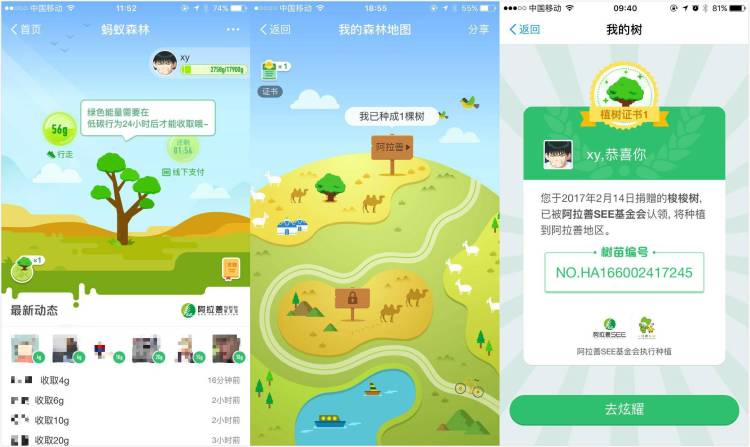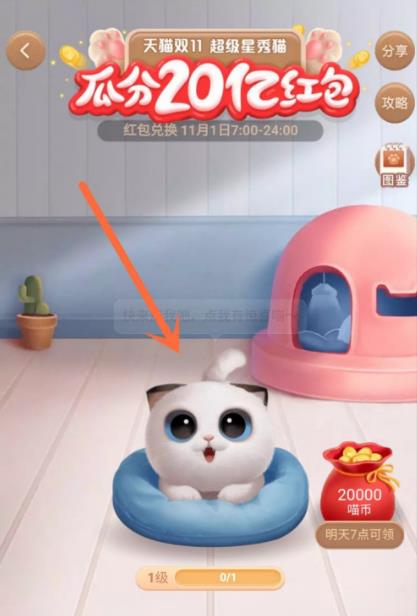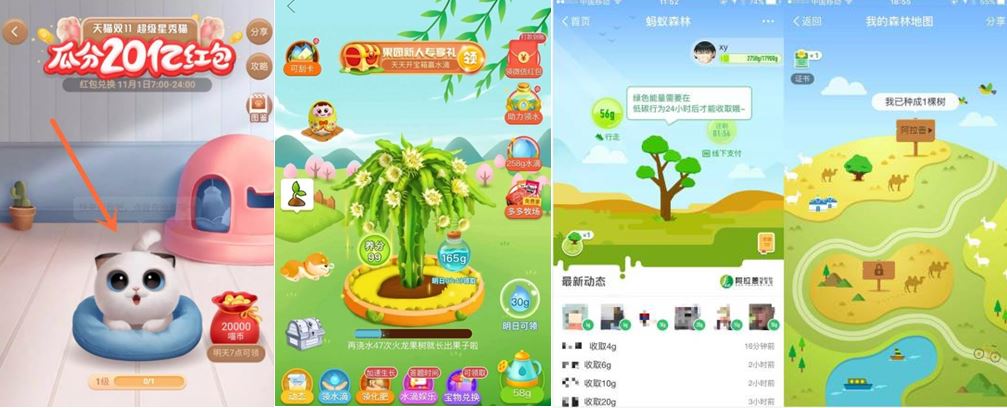E-commerce gamification in China was one of the top marketing strategies during Double 11 2020. Consumers are exposed to more stimulation than ever before. Thus, the traditional marketing tools like TV commercials don’t work like they used to. Companies have found more creative and engaging ways to capture consumers’ attention, which lead to the rise of mini games in Chinese e-commerce. Through those mini games, brands aim to attract consumers, increase their engagement, and then convert sales. The success of gamification in e-commerce shows that nowadays consumers approach shopping not just as a necessity but also as entertainment.
Gamification in China actually started from charity
E-commerce gamification in China started with Alipay – a third-party online payment platform owned by Alibaba Group. In August 2016, Alipay came out with “Ant Forest”, a tree-planting mini game in the Alipay app. This game aims to support low-carbon lifestyle and environmental protection.
In “Ant Forest”, when users take public transportation or walk instead of drive, buy e-tickets instead of paper tickets, and make payments through Alipay, they get “green energy” which contributes to virtual trees. These virtual trees represent real trees that are planted in the arid areas of China. In 2019, “Ant Forest” won Champions of the Earth by the UNEP (United Nations Environment Programme). By 2020, it has gained more than 550 million participants and planted 223 million trees.

Source: Alipay, mini game “Ant Forest”
Besides public benefits, what “Ant Forest” really achieved is customer stickiness and customer activeness. These two characteristics bring Alipay a socially responsible brand image, more payments made, and products sold through its platform.

Source: Pinduoduo, Xinhuanet, mini game “Duoduo Orchard”
Since then, e-commerce gamification in China expanded to other platforms. In April 2018, PinDuoDuo launched a similar tree-planting game called “Duoduo Orchard”. Different from Alipay’s charity contributions, what consumers receive from this “orchard” are actual fruit products as a reward for successfully growing a digital fruit tree. But as a matter of fact, this game actually does have a positive impact on the poor rural areas in China.
In 2018 and 2019, almost all of the mainstream e-commerce platforms, including Taobao, Tmall, JD and Suning, have also released mini games. Many of the games share similarities. Users have to log in everyday, finish certain tasks in exchange for rewards (usually discounts or coupons), and then make purchase stimulated by those rewards.
Taobao leads in Double 11 gamification
E-commerce companies have also designed mini games specialized for shopping festivals in China like 11.11. The most popular ones are from Taobao.
Taobao, Alibaba’s main e-commerce platform, has used many popular mini games during the 11.11 shopping festivals in China. In 2017, Taobao consumers would have to pay a small amount of deposit two weeks before November 11th, and then they could participate in some red packet grabbing games to get more discounts. In 2018, Taobao launched a new game where consumers could build up two teams and compete with each other for discounts. The team that got more likes from their friends would win and earn more discounts. The top teams of the platform would win very big prizes.
In 2019, Taobao invented a new game based on the previous year. This “skyscraper building” game was the most popular game yet. The core idea of this skyscraper building game was team building. A participating team would start a competition with another team every day from 9am to 10pm. The team who invited more friends to cheer for them would win the competition and earn cash. This game attracted 300 million participants within one week. During the 5 days of the game, WeChat was flooded with messages of people inviting their friends to help with their skyscrapers.

Source: Taobao, mini game “skyscraper building/Gailou”
For Double 11 2020, Taobao took a more cooperative approach to gamification
In 2020, Taobao took out the competitive part of its 11.11 game and replaced it with a more cooperative game “pet cat raising”. Every consumer started with their own pet cat and fed their cats with “Meow Coins”. In order to get more coins, consumers are required to do tasks such as viewing store pages, searching for certain products and inviting their friends. The game was a huge hit, on October 21st, the day the game was launched, it has already reached more than 100 million active users, a number larger than Honor of Kings (one of the most famous mobile games among Chinese customers). One gamer was so proud of his cat, he rented a public advertising space to showcase his virtual cat.

Source: Taobao, Pet Cat Raising game
How gamification drives sales
E-commerce gamification in China comes in various forms, but the main functions and goals are almost the same. All of them have the purposes to reach more consumers, to have them spend more time in the store and do more purchases, and they reach these goals by using the following functions.
The sharing function helps activate more users
Consumers need an initial trigger to join the game. This trigger is usually able to build a bond between consumers’ interest or emotion and the game. In the pet raising game, many people are naturally in favor of cute cats, and that makes them join the game at the beginning. Later on, consumers would want to get “coins”, which leads them share the game with their friends.

Source: WeChat, People sharing the games in WeChat groups
The task-completing function helps increase consumers’ time spent along with conversion rate
After consumers are already in the game, they need to “upgrade” or “raise” their pet cat by completing tasks. These tasks are viewing the pages of discounted products for more than 15 seconds, searching for certain products (which are often recommended products based on user portraits from big data), or participating in other games on Taobao. This process exposes consumers to more products than they would normally search for.
Moreover, the mini games in Chinese e-commerce are usually separated into different stages or levels. When consumers finished one stage, they are more likely to continue on to the next stage. The more tasks they finish, the higher their sunk costs and the higher possibility that they will not give it up.
The reward function helps build positive feedback
The e-commerce games incentivize consumers with rewards. These rewards are usually cash, discounts and coupons which directly lead to purchases. Psychologically, these rewards provide consumers with a positive feedback and, if they’re really into it, a sense of accomplishment. Therefore, they are even more inclined to keep going on with the games and achieve more rewards.
Where E-commerce gamification in China falls short
However, mini games in Chinese e-commerce have also received some criticism. Those who don’t participate in those games are annoyed or harassed by the constant invitations to join. They Some have gone online to complain constantly getting messages and invitations from peers. Second, these games take considerable too time and energy, but participants don’t feel they receive enough rewards to justify the time spent. For instance, some people spent their whole day on the game only to receive ten RMB. Third, some participant became so competitive that they even started to pay money just to win the game, and they ended up losing more money than they won. If entertainment is the primary approach, then the discounts can be seen as a cherry on top. But if consumers are expecting discounts, then the game would not be worth it to them.
Learn about WeChat mini-games in China
Listen to over 100 China entrepreneur stories on China Paradigms, the China business podcast
Listen to China Paradigm on Apple Podcast






